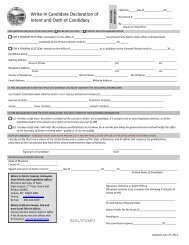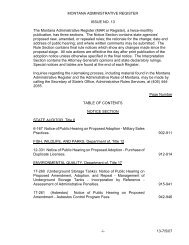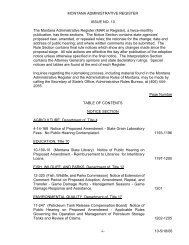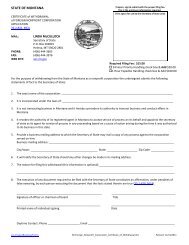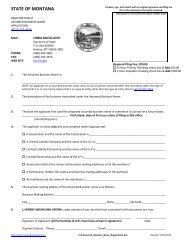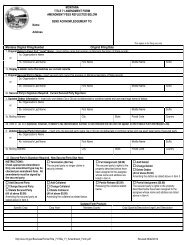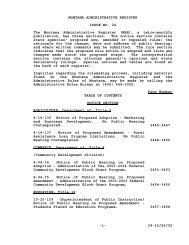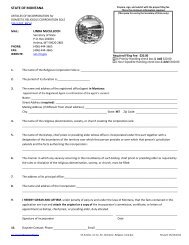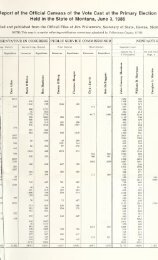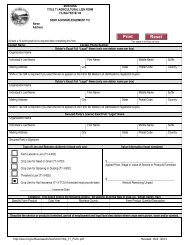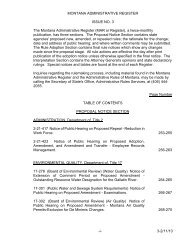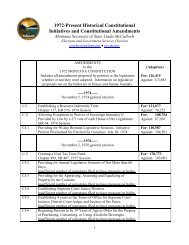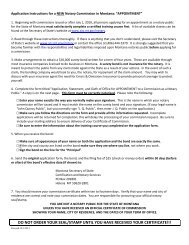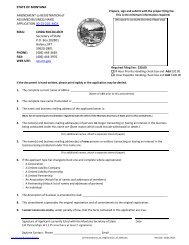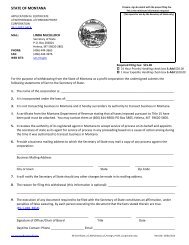Notary Handbook - the Montana Secretary of State Website
Notary Handbook - the Montana Secretary of State Website
Notary Handbook - the Montana Secretary of State Website
Create successful ePaper yourself
Turn your PDF publications into a flip-book with our unique Google optimized e-Paper software.
FREQUENTLY ASKED QUESTIONS FOR CHAPTER 2<br />
Q. How does a notary know what type <strong>of</strong> notarial act to perform?<br />
A. If <strong>the</strong> document contains a preprinted notarial block, <strong>the</strong> “description” tells you what to do. See pages 13 - 14 <strong>of</strong> this<br />
handbook for more detailed information about how to determine what type <strong>of</strong> notarial act <strong>the</strong> notarial block is directing you to<br />
perform.<br />
If <strong>the</strong> document does not have a preprinted notarial block, you must ask <strong>the</strong> person requesting <strong>the</strong> notarization what type <strong>of</strong><br />
notarization is needed. A notary cannot make that determination, as that would constitute <strong>the</strong> unauthorized practice <strong>of</strong> law. If<br />
<strong>the</strong> person doesn’t know, <strong>the</strong> notary should advise <strong>the</strong>m to contact <strong>the</strong> source <strong>of</strong> <strong>the</strong> document to find out <strong>the</strong> desired notarial<br />
act and <strong>the</strong>n use <strong>the</strong> appropriate format.<br />
Q. Must I keep a journal?<br />
A. Effective October 1, 2009, <strong>Montana</strong> law requires that <strong>Montana</strong> notaries keep a journal <strong>of</strong> <strong>the</strong>ir notarial acts. A journal is a<br />
record <strong>of</strong> <strong>the</strong> notarial acts performed and can be vital in protecting <strong>the</strong> notary from possible liability. The journal must be an<br />
electronic record or bound book where <strong>the</strong> following information is recorded for each transaction: date <strong>of</strong> <strong>the</strong> notarial act; type<br />
<strong>of</strong> notarial act; type <strong>of</strong> document; signature, printed name and address <strong>of</strong> each person for whom a notarial act is performed;<br />
and type <strong>of</strong> identification used.<br />
Q. Can I notarize my spouse’s or o<strong>the</strong>r family member’s signature?<br />
A. Yes – as long as you are not named in, or a direct beneficiary <strong>of</strong>, <strong>the</strong> transaction referenced in <strong>the</strong> document being signed<br />
you may notarize <strong>the</strong> signature <strong>of</strong> a family member.<br />
Q. What is a “signing agent”?<br />
A. A “Signing Agent” is a notary public who specializes in <strong>the</strong> process <strong>of</strong> obtaining and notarizing <strong>the</strong> signatures <strong>of</strong> <strong>the</strong><br />
party(ies) involved in real estate loan documents for <strong>the</strong> purpose <strong>of</strong> closing a real estate loan transaction. <strong>Montana</strong> statutes do<br />
not specifically reference this term.<br />
CHAPTER 2 – Quiz<br />
T_____ F_____ 1. There are three ways to properly identify a person for notarial purposes in <strong>Montana</strong>:<br />
(a) personal knowledge; (b) satisfactory evidence, or; (c ) a credible witness.<br />
T_____ F_____ 2. A notary may accept a copy <strong>of</strong> a document and certify it as a true and correct copy <strong>of</strong> <strong>the</strong><br />
original.<br />
T_____ F_____ 3. The most important part <strong>of</strong> <strong>the</strong> notary’s job is to create an <strong>of</strong>ficial record <strong>of</strong> his or her <strong>of</strong>ficial acts<br />
because this serves as prima facie evidence to prove <strong>the</strong> statements made by <strong>the</strong> notary in <strong>the</strong><br />
notarial block are true.<br />
T_____ F_____ 4. Every <strong>Montana</strong> notary is empowered to perform five notarial acts; notaries with additional<br />
training may also perform two o<strong>the</strong>r types <strong>of</strong> notarial acts.<br />
T_____ F_____ 5. A notary may not notarize <strong>the</strong> signature <strong>of</strong> a minor child.<br />
Answers:<br />
1. True.<br />
2. False. The notary must make <strong>the</strong> copy <strong>of</strong> an original document before certifying it to be a true and original copy.<br />
3. True. The notary’s journal is <strong>the</strong> key to protecting <strong>the</strong> notary, <strong>the</strong> notary’s employer, and <strong>the</strong> public from fraud.<br />
4. True.<br />
5. False. As long as <strong>the</strong> child can be properly identified and can express an understanding <strong>of</strong>, and willingness to sign <strong>the</strong><br />
document, a notary may perform a notarization regardless <strong>of</strong> <strong>the</strong> person’s age.<br />
15



